Ghosts (J.M. Frey)
$1.99
An Accidental Turn Novella
For seventeen years, Bevel Dom has been the author of his own story. Or, rather, he’s been the author of The Tales of Kintyre Turn, the illustrated scrolls chronicling his adventures as first the squire, then the colleague, and then finally the friend of legendary hero Kintyre Turn. But there are some stories that Bevel doesn’t write down, doesn’t tell to eager audiences of bright-eyed boys and sighing bar wenches in taverns. Some he simply folds into his heart and keeps. This is one of those tales.
In this prequel novella, fans of The Accidental Turn Series are offered a glimpse into the lives of Bevel Dom and Kintyre Turn shortly before their arrival at Turn Hall and the events that follow, further expanding upon the world and characters seen in The Untold Tale and the the upcoming sequel, The Forgotten Tale, coming Summer 2016.
Additional information
| Format | ePub (Nook), Mobi (Kindle), PDF (Other) |
|---|
Read The First Chapter
One
The messenger hawk is only odd because it wears a band of Turn-russet around one leg. I’m more used to seeing Carvel-green, or, if Mum can scrape together enough to cover the expense of a hawk and the emergency is dire enough, Dom-amethyst.
It lands first on a branch close to Kintyre’s head, overhanging the stream where Kin is grumpily scrubbing our travel pots out with sand. As he always does, Kin ignores the ruddy thing. The hawk chirrups in disdain and hops down to the ground. It bobbles over to me like a grouchy pigeon, sidestepping the still smoking ashes of my morning cookfire. I was in the middle of packing away our leftovers, so I’ve got some jerky in my hand. I offer it up, and the hawk snips at it daintily, careful of my fingers. The beast is probably the politest of the three of us. Kin and I don’t work too hard on our table manners when we’re out-of-doors.
“Never know why you lot always go to Kin first,” I say, wiping jerky grease on my trousers and then shaking a finger at the hawk. “I’m the one that feeds ya.”
As a kind of answer, the hawk fluffs up in the sunlight, resettling its feathers after what has probably been a long flight. I’ve always liked how sleek the creatures are, how deadly, and at the same time, how much they look like a curious cuddle toy. The hawk lets me scritch along the crest between its eyes, crooning. I smooth back the small plume of white that marks this bird as a messenger, as one of the breed clever enough to recognize different human faces and follow simple verbal commands. Dead useful things, these birds.
Appeased, the hawk lifts its foot and I untie its burden. Covering a yawn—didn’t sleep so well last night—I wonder if there’s enough heat in the embers of our fire to kick it back up and boil another kettle of tea. It’s not like Kin and I have anywhere else to be, and the thought of a long, lazy morning fishing and napping is suddenly delicious. Yeah. Could do lots with a day of nothing.
I’m also missing the warmth of the last lassie we left behind, if I’m honest about it. And that of her father’s hayloft as well. But we’re one day’s walk from Estagonnish, and there’s no bloody inns between here and the next sprout of farms. Just sparse forest interspersed with wildflower meadows, and the curving sweep of a balls-cold stream.
Good for catching rabbit and eel. Bad for a good night’s rest. And after all the adventures we’ve been on—and enemies we’ve made—I’m not too keen on sleeping out in the open. Or, really, anywhere that’s lacking a roof and walls, a door that can be booby-trapped, and a window that makes noise when it’s broken. Sleeping out under the stars sounds heroic when I write that sort of drivel, but in reality, it fills me with wary paranoia. And it’s bloody chilly to boot. ‘Cause unless there’s a pair of tits between us, Kintyre’s not too keen on sharing body heat.
Shame, that.
Of course, this bone-weariness knifing through me doesn’t just stem from bad sleep. Not even really from our most recent quest, or from the bloody great sword-fight it took to vanquish the Dark Elf. No. It’s from the many, many houses filled with so many grieving people.
I am wrung out from comforting so many husbands and wives, parents, children, and lovers while returning the jars of eyes stolen and collected by the elf. Their grief is like a greasy smear against my skin. I feel a hundred years old, pulled loose and weak by the weight of it.
Sadness always makes me absolutely bagged.
I yawn again and try to cover my mouth, then wince, juggling the hawk’s note into my off hand. Writer’s nutsack, that aches. In my morning haze, I forgot that I wrenched my wrist in the fight. I’m going to have to rewrap it soon. Or maybe I should go shove my arm into the stream for a bit, see if the cold won’t do some of its own magic on the swelling.
The bird, freed from duty, pops up onto a nearby branch and preens its wings. It’s trained to wait for a return message, if I want to send one. But more likely it’s waiting for more jerky. I could send it away, back to Turn Hall, with the hand gesture that means “go home.” It would go, empty-pouched and immediately, but . . . nah. Maybe, like me, the damned thing deserves a rest after its long task. Maybe it could use a lazy afternoon on the riverbank, too. I could feed it fish guts, if it wanted them.
Or maybe the hawk might appreciate a mug of reviving tea. That brings up the image of a hawk with its whole head jammed into one of our metal cups and I grin. Then I stand, wiping soot on the thighs of my leather trousers.
“Kin,” I chortle. “Post!”
“Who’s it from?” Kin asks, standing. He leaves the pots by the shore—hopefully somewhere where they won’t wash away again, or I’ll put my boot up his arse and make him go for a swim to fetch them back—and saunters his way back to the campsite, in no rush this fine morning. Kin squints at the hawk’s leg-band. That wrinkle appears between his eyebrows, the one that I still haven’t been able to describe correctly when I write about it. “Not actually Turn Hall?”
“Why not Turn Hall?”
“Most likely the sheriff,” Kintyre says, dismissing my question and the assumption that it could be his younger brother all at the same time. “Sneaking Forssy’s things again.”
“You know, your brother is actually quite generous,” I point out. “Never lets us leave Turn Hall without full ration packets and wineskins. ‘Course, he’d never admit it.”
“He’s a pretentious twat.”
“I won’t argue with that. I’m just saying he’s a generous pretentious twat. Pointe wouldn’t’ve had to sneak anything, is all I’m saying.” I hold out the message, but Kintyre folds his arms and glowers. His stupid rivalry with his brother now apparently includes him not even stooping to open his more-superior-than-thou brother’s letters. “Come on,” I cajole.
Kintyre’s only answer is a huff and rolled eyes.
“Fine,” I say, and untie the leather lace keeping the message rolled. “Huh. It really is him.”
“It is?”
“It is.”
Kin tries not to look interested, but I can tell that he is. He’s trying to peer over my shoulder out the side of his eyes. “What’s the book-mouse want?”
I suck air in between my teeth, unsure of how to say this without setting Kintyre off. I’m sure as the Writer’s calluses not going to actually read the message out loud. That’s just asking for an hour of pacing and ranting. “You, apparently. We’re being summoned.”
“He can’t summon me.” Kintyre bristles, and I barely manage to clamp down on my own eye roll. “I’m the eldest.”
“But he’s the Lordling of Lysse,” I remind him. “And he summons us.”
Kin grumbles, but asks, “What for?” He leans over my shoulder, taking up all my space, like usual, and sucking all the air out of the world. He peers at the parchment, a tongue of corn-silk hair brushing against the skin just under my ear.
The shiver it causes is entirely involuntary, and I squeeze my eyes closed, and swallow hard.
Bastard. I try very hard not to wonder if he’s doing it on purpose. If he knows.
Of course he doesn’t know.
When I’ve got myself composed again, I turn my face up to him and grin, ignoring the way his mouth is just right there and I could—auhg.
Bastard.
“An adventure,” I say, and the grin I force across my face has the perfect partner on Kintyre’s. Without even looking, Kin smugly waves the hawk back to Turn Hall, message-less.
✍
The way to Lysse leads us back through Miliway Chipping, and the road spears through the prairie lands that provide Hain with our staple grains. Farmers don’t mind travelers camping on the side of the road, but are understandably wary of grass fires. This means that in the breadbasket of Hain, no traveler is allowed to light a campfire. And that means no nighttime cooking, and no nighttime heat.
It’s still spring this far north, and the nights are still just this side of too chilly to sleep without a fire, or alone. I’m now really missing that last lassie, and I wonder blithely if it isn’t too late to backtrack to Estagonnish and invite her to Turn Hall with us. Of course, what to do with her when we get there is a problem I don’t want to deal with. ‘Cause I sure as the Writer’s ink-stained fingers don’t want to marry that one.
Mum wouldn’t approve at all—the lass was all bosoms and no brains. Good for a while, but not good for a wife. And nobody I would trust to leave behind with the resulting sprogs while I go adventuring. She might set the thatch on fire if she tried to cook. Besides, I wouldn’t want to Pair up with someone I couldn’t take along on the road, anyway, so that excludes pretty much anyone at all.
Except . . .
Aw, ruddy bollocks. Now I’m back to thinking about how Kin and I will have to lay side by side in our bedrolls to stay warm. I scrub my eyes, trying to will the ridiculous domestic fantasy out of my head and pay attention to where I’m walking.
I must be getting old, like my brother Dargan teased the last time I was home. He said the older you get, the less willing you become to dither about things that are important. At first I laughed it off, but it’s been two months since I last stopped in Bynnebakker and his warning has been eating at me ever since. Prat.
My wrist throbs again, as if agreeing with Dargan’s bit of pithy wit. I’m getting old. I’m getting slow. I barely blocked that blow from the Dark Elf’s sword, and damn near broke my wrist for the trouble. I don’t have the protection of an enchanted blade, or the skills taught to a lord’s son, like Kintyre. I’ve just got forge-earned muscles, a good piece of dwarf-crafted weaponry, and all the wily tricks that come with being the youngest of seven boys. And lately, they’re all starting to seem like not quite enough.
I suck on my lips for a moment, thoughtful. Maybe I was hasty in dismissing the idea of a wife. Sitting by the fire, playing with dogs and babies while someone cooks for me for once sounds like a kind of paradise right now.
If only it could include my best friend.
Ugh, and there is that damned domestic fantasy crap again. I need a distraction. Fine. I start cataloging what I can remember of our travel stores, and the result makes me groan loudly enough that Kintyre looks back over his shoulder and grunts, questioning.
“We’re gonna need to stop before we get to the grasslands.”
Kintyre grimaces. “Aw hells, cold rations. I forgot.”
“Yeah. For at least three days.” I kick at a stone in the path to keep from having to look up at his ridiculous face when I make the suggestion I’m about to make, knowing he isn’t going to like it. “We could rent horses? It would go faster.”
Kintyre grunts, but otherwise doesn’t reply. Kin hasn’t been fond of horses since Stormbearer, the horse Kin’s father gave him, was slain in the Battle of the Walking Woods. I hadn’t been all that attached to my own horse, a fussy old nag named Hey You who had also felt Stormbearer’s death keenly. I’d left Hey You with my older brother Vulej just a little over two years ago.
Vulej’s wee ones apparently love the wretch, and whenever I pick up post from my pa’s forge, there’s always shaky pencil smudges on the edges that my sister-in-law assures me are drawings of Hey You giving the twins rides to the Hay Market. I keep them all in a well-oiled leather fold at the bottom of my pack. I have very little in this world aside from Kintyre and my family, so I try to keep both of them as close as possible.
It’s sentimental, sure, but a man’s gotta have something worth fighting for, something a little more tangible than reputation, and glory, and the fleeting bliss of a lassie’s charms.
“Right then, no horses.” I sigh, and keep marching. “Arse.”
It’s just past midday when we reach the first of the farms. Out flung houses surrounded by gleaming acreages of lively, growing green things always mean there’s a center of commerce and civilization nearby. If I remember correctly, this particular center had a goodly number of taverns and markets last time we were through.
And good company, too. Blonde, I think she was, but in truth they all sort of blur together in my memory. It’s really only Kin that stands out in my . . . recollections.
Mind clearly wandering the same paths as mine, Kin finally slows his damnable long-shanks striding and falls back to match pace with me. “Do you think we’ll meet someone in town? We’ve got time for it, right? You can find us one.”
My knee-jerk reaction is to stick my tongue out at him like one of my nephews. Or to flick a rude gesture at his back. Or to say: “Aren’t I enough for you?” Or sometimes: “If you do, don’t involve me. I want nothing to do with it anymore.” Or sometimes: “Enough, I’m done with you. I’m going home to work in my pa’s forge and forget you.” Or sometimes: “I love you.”
Writer’s bollocks, sometimes I want to say nothing. I want to just grab Kintyre’s ears, wrap my fingers behind the tender pink shells and pull him down for a soft, wet, sleepy kiss, full of all the dopey affection I can’t seem to rid myself of. Sometimes I want to get my calf in behind Kintyre’s knees, give a shove of my hips and sprawl the arrogant prick on his ass, get a fist into the laces of his trousers and slurp down his—
Bastard.
He doesn’t even understand all the ways he’s killing me. The ways I’m torturing myself, because it’s ridiculous. We’re Paired, but not like that. And it will never be like that, and damn Dargan to all the hells of the Writer’s imagination for planting this stupid bloody seed of thought in my chest anyway. I’m going to kick my brother in the nutsack the next time I see him, and damn what his wife has to say about that.
“We’ve got time,” is all I let myself answer from between my clenched teeth.
I shove my hands in my pockets, annoyed by my own cowardice. “We’re not to be in Turnshire for a fortnight, and it will only take a few more days to reach Lysse.” I heroically don’t add that, perhaps, if this is the village with the blonde, we should move on immediately after resupplying. It’s entirely possible that either of us may be confronted with the harvest we sowed on our last trip through.
Kintyre doesn’t answer, as usual, so I let my mind wander down the path the thought of kids has begun to lay. I always thought there would be children in my life. I actually want to be a father. Being an uncle is wonderful, even though I only see the little pests infrequently. I love the squirts, and it’s great to see how much they’ve grown, all that they’ve learned, the ways their personalities and preferences develop between each visit. The youngest of the horde seems to think that “poop” is the funniest damned word the Writer ever Wrote.
I want their chubby, sticky fingers locked around my neck, the sweet kisses, the cuddles, the little feet racing through the hallways shouting, “Pa’s back! Pa’s here!” There’s something more, something magic in the way they say that to their fathers, different to the way they shout “Uncle!” when I surprise one of my six brothers at home. Almost like “Pa” is a Word, instead of just a word, and one that I want to mean me. I would like a home to go back to, I think. A place where it’s warm, and I can sit by the fire and be adored by everyone around me because I adore them back.
That had always been the plan, anyway.
Grow up, work with Pa in the forge, marry a farmer’s daughter, build a croft, raise a brood, and spend the rest of my life shoeing horses and being loved.
But then a handsome lord’s son came along, and that was the end of those dreams. I could have a wife, a home, the children, if I wanted. But that would mean no Kintyre.
A sudden thought drops into my stomach like a fire-warmed stone: I’m tired.
This is not the grief-born weariness I felt this morning. This is something else, something deeper, something that has soaked into my skin and settled in the dark marrow of my bones. This is something that is etched on the very fiber of my muscles, the pull of my tendons, the lining of my stomach. This is something born of Dargan’s careless teasing, yeah, but also the contemplation that his words have caused over the weeks since I was in that tavern with him, both of us a little too far into the keg.
I am tired.
I am tired of walking, tired of traveling, tired of having nowhere to call home, no place to call my own, no pillow and bed waiting at the end of the day, no surety of the next meal. I am tired of following after Kintyre Turn and wanting. I am tired of not having.
I am tired, and I want to stop.
I could pay for somewhere to call my own, true; I’m not much for banks and moneylenders, but I’ve squirreled away the reward purses I didn’t give over to Mum over the years. I don’t need to build a croft now—I’ve got more than enough clink to buy a cottage, a few acres, some pigs. Probably a calf. Or five. Or ten, really. Right, so there’s actually probably enough to buy a title and the estate that goes with it.
Hells, King Carvel has offered me one often enough. Maybe I could just write to him and tardily accept. Though what on the Writer’s hairy backside I’d do with the trappings and responsibilities of a lord, I don’t know. I wasn’t raised to it. I’d have to hire someone to do all the actual work, and the life of an idle gentleperson is not even close to appealing.
The only thing I am certain about is this: Kin would never live with me.
Even if Kintyre Turn did finally settle down, turn in his sword for a ledger or a plowshare or a guardsman’s cap, it would be with a buxom woman who could gift him with little Turnlings. More likely, it would be with some nobleman’s daughter or simpering princess, and it would be on the coin of a king, or the late Algar Turn’s estate, where his brother Forsyth would maintain the responsibilities of Master while Kin enjoyed the luxuries with which he’d been raised.
If Kin stopped, that would be it. There would be no room in Kintyre Turn’s life for a Bevel Dom, his questing partner, sword-mate, and dogsbody. And a life for Bevel Dom with no Kintyre Turn in it is a life I’m afraid I might not actually have the strength to live.
I know with the surety of a man who has been in love for half his life with someone who will never be aware of it that I will die of heartbreak, or maybe by my own hand, the day Kin marries someone else.
And Writer, that sounds melodramatic as bloody anything. More fit for my scrolls than my thoughts, but there it is. I jam my fists down harder in my pockets and hunch, chewing on my bottom lip to keep from scowling.
And the bastard is still walking, just a few paces ahead, like his long legs can’t be bothered to shorten his stride for the sake of anything as banal as a short companion. Fine.
So I do as I have always done: I put one foot in front of the other. I shove the weariness away, raise my chin, squint to keep the sun out of my eyes, and follow after Kintyre Turn.
The tiredness can be ignored.
✍
He’s unpleasant from the moment he dismounts, is how I introduced Kintyre Turn in the epic scroll-series that documents our adventures. But that’s a much kinder way to think of it than how I really felt.
“What an elfcock,” was what actually came out of my mouth. The twat had wanted me to drop what I was doing to replace a thrown shoe on Stormbearer, which was both arrogant and entitled. And he hadn’t even been willing to pay extra for the inconvenience.
Now, watching the way Kin’s swagger increases the closer to the village we get, the same sentiment rolls between my ears.
Though I’m not annoyed enough to admit that the thought of finding a nice warm bed with a nice warm woman does sound appealing, but for reasons different to Kin’s. I torture myself with it, I know, the thought of finding a way for it to be okay to reach out, to touch, to stroke . . . damn Dargan anyway!
All the same, my own swagger is probably just as pronounced, so I say nothing about it. The view from a few paces behind Kin is a nice one, after all. Kin’s customary leather trousers seem to be especially tight today, and his Sheil-purple jerkin leaves very little to the imagination.
I catch myself licking the road-dust from my lips and decide to be optimistic. A bed tonight, shared sleep rolls for the next three, and six days on the road with just Kin for company, except for the taverns or inns we’ll stay at. No battle stress, no strategies, no deadlines nor swords looming over our throats. No insidious plots, no villains to roust, no blood.
Just nice, calm, congenial conversation, honestly earned sweat, and at the end of all that, Turn Hall with its feather mattresses, large copper tubs, and fresh baked bread waiting for us. Even the adventure Forsyth proposed in his missive seems more like a walking holiday than a quest—escort damsel in distress from Turn Hall to her far-off home? Easy!
Maybe there’ll be some bandits en route, which will keep my sword arm from getting too rusty. Maybe there’ll be some fancy politics and fast talking when we get the damsel in question to where she’s meant to be, just to make it clear that we weren’t the ones who took her in the first place—that will keep my wits from atrophying. But most likely it will be boring, easy, and finish in a feast. We’ll have forged yet one more ally, have one more community in which we’ll be welcome, maybe even one more castle from which we can draw supplies.
And, if the damsel in question is amenable, the nights of the journey will be warm for other reasons. I like the adventures like that.
Either Kin will try to seduce her first, or I will, but neither of us leaves the other out. Hard to, when you’re on the road and there are no walls between you. I do like that about traveling with Kintyre—everything we have, we share. The burdens, the battles, the packs, the blood, the joys, the feasts, the wine, the women, and sometimes, though we never talk of it, the nightmares. That is something I will never grow tired of. The sharing. Not the nightmares. Those can just go right back on whatever Shelf the Writer pulled them off of.
By mid-afternoon, we’ve reached the outskirts of a small market village. The sign by the side of the road depicts a festival of sorts, something with fire and foliage, as well as the place’s name.
“Gwillfifeshire,” Kin reads, carefully parsing out each of the tangled syllables.
“Gilsher,” I correct, the side of my mouth quirking up at his gaffe.
“But there’s—”
“It’s pronounced gil-sher, Kin,” I insist.
Kintyre points indignantly at the sign.
“Yeah, I see it,” I say mildly, determined to hold on to my self-imposed good mood. I hook my thumbs into my belt and nod. “But that’s how they pronounce things ‘round this area.”
The wind goes out of Kin’s sails when I refuse to rise to the verbal spar and his shoulders slump. Instead, Kintyre readjusts his pack, head high and fingers curled lightly on Foesmiter’s pommel, and leads the way toward the small square as if he actually remembers being here before. He doesn’t. I know he doesn’t, because he never does.
The square is the only open space amid the cramped, close buildings of the village. There are three or four layers of buildings separated by cobbled streets spreading back from the square, which get progressively smaller, made of more wood than stone, and finally give way to an open meadow. In the distance there’s a knoll, and atop the knoll is something gray and crumbling, probably an old monument, or the remains of a castle. Many of the house walls are made of that same gray stone, so it was probably dismantled for building materials a century or two ago.
There isn’t much use in statues and monuments, I guess, when there are houses and barns to build and hewn bricks already on hand. I approve of the sensible repurposing, but Kin, who grew up in a manor house with a wing to himself rather than amid a pile of brothers in a three-room cottage, is always vaguely upset that the beautiful architecture and statues have been pulled down.
He’d never own to it, of course, but Kin is secretly a great admirer of the arts. The deep well of his affection for anything creative always raises froth and waves when something beautiful is destroyed—more so if it was vandalized or dismantled so long ago that there’s no way to even know what the original art looked like.
Kin is predictably glowering at the top of the knoll, huffing in indignation. He gets that wrinkle between his eyes, and he fingers the small whittling knife he carries in its own leather sheath alongside Foesmiter, and chews on the outside corner of his mouth. He looks like a drakeling. It’s hilarious.
Just once, I gave in to the urge to reach out and press my thumb against that swollen, abused lip, but Kin didn’t meet my eyes, didn’t look up, didn’t lean forward, so I’ve never done it again. Doesn’t mean I don’t want to, though. Resisting the urge, I say, “Draw it for me. The way you think it looked.” He usually does, when I ask him, and it makes him feel at least a little better about it all.
In the seventeen years we’ve been traveling together, Kintyre has acquired a sword, a questing partner, maidenheads and titles, prize purses and scars. But I firmly believe that the most important thing Kin ever picked up in all that time was a pencil. He’s always so much calmer, so much more content when he’s had the time and tools to draw. There is no better way to distract Kin out of his agitation and worry than to put him in front of a blank piece of parchment.
Maybe tonight, we’ll forget finding someone to seduce and go out to that knoll with a torch and our stationery cases. Kintyre will sketch the statue as it once was, and I can lean back against him, spine to spine, our ribs pressing together warmly with each of Kin’s inhalations, sharing support and warmth as I compose the tale of The Eerie Eyes of Estagonnish.
The scene I create in my mind fills me with a hot swell of yearning, as appealing as my little domestic fantasies from earlier, and no less ridiculous. I can almost feel the cool night breeze on my cheeks, the backs of my hands, the hollows of my wrists—along with the ache in the small of my back from carrying this ruddy pack all day and the pain in the bottom of my feet from the walking. I’m north of forty now, and yeah, the Doms are long-lived—Pa is going on seventy soon—but that doesn’t keep us from feeling our age. Still, I can almost smell the pine pitch, the grass, and the special butter soap that I hoard and only dole out in small shaved curls for scrubbing away road-dust when we can hire a proper tub. There would be graphite and stone, and the crisp spring of grass under us. If I close my eyes, block out the harsh sun and the reek of the open gutters, I can just feel warm skin, a wet mouth as we both lay aside our tools, a hot push against my stomach, and . . .
Stop, I snarl at myself, and open my eyes. Kin is nearly around the next bend, all but lost to sight. I’ve been dawdling as I daydreamed and rush to catch up, moving as fleetly as possible to hide that I was ever gone. Secret. Shamed.
As the fantasy ebbs, I feel both empty with want, starving for touch, and at the same time, strangely at peace. I can’t deny that I desire what I do: the small domestic instants, the quiet, the stars. Dargan was right: things that didn’t seem important fifteen years ago, ten years ago— Writer, even three years ago—seem as vital as water and bread now. But these small, stolen moments will have to feed me. I consume them greedily, stockpile them carefully, and turn them over and over in my mind on days when things are bad.
And if I’m honest with myself—I should be, it’s the least I owe me—if I’m really, truly honest, I know that this is all I’ll ever have. The small moments, and the hoarded memories, and the oblivious companionship of Kintyre Turn. I will never have more.
At least until we’re old enough to stop adventuring and settle in one place. If we settle together at all. I think back to that croft, that cottage, that estate I’ve been building in my imagination, but instead of a hearth with a rocking chair, surrounded by puppies and babies, a wife in the chair opposite me placidly cross-stitching, I conjure up Kintyre with his pencil and sketching book. Maybe Forsyth will take pity on a graying old adventurer and let me live out my retirement in Turn Hall. No babies. Maybe puppies.
And wouldn’t that be a sight: three old bachelors, sniping at each other until we die, heirless and cranky, surrounded by slobbering dogs.
If we live to retire, of course.
I rub my wrenched wrist and frown. I may fantasize about the domestic life, but I also have no illusions about the sort of life I lead. I stretch out my arm, circling my left hand under its bandages.
A few paces ahead of me, Kintyre stops so abruptly that, lost in my wool-gathering, I nearly run nose-first into his pack. He’s peering up at a painted sign, hanging above a large, clean window of lead-mullioned glass cut in the shape of diamonds.
“What about this one?” he asks. His gaze drops to the window, and he smirks, then throws a smug look over his shoulder at me. “Seems perfect to me.”
“The taproom?” I ask with a chuckle. “Or the truly spectacular tits behind the bar?”
Only logged in customers who have purchased this product may leave a review.
You may also like…
-
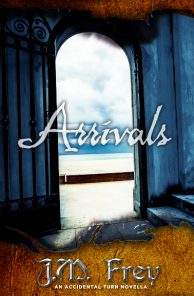
Arrivals (J.M. Frey)
$1.99 Select options This product has multiple variants. The options may be chosen on the product page -
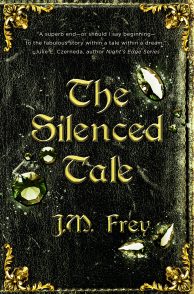
The Silenced Tale (J.M. Frey)
$5.99 Select options This product has multiple variants. The options may be chosen on the product page -
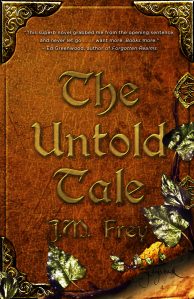
The Untold Tale (J.M. Frey)
$5.99 Select options This product has multiple variants. The options may be chosen on the product page -
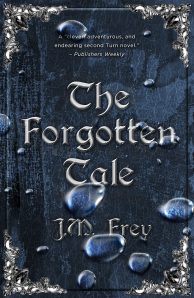
The Forgotten Tale (J.M. Frey)
$5.99 Select options This product has multiple variants. The options may be chosen on the product page


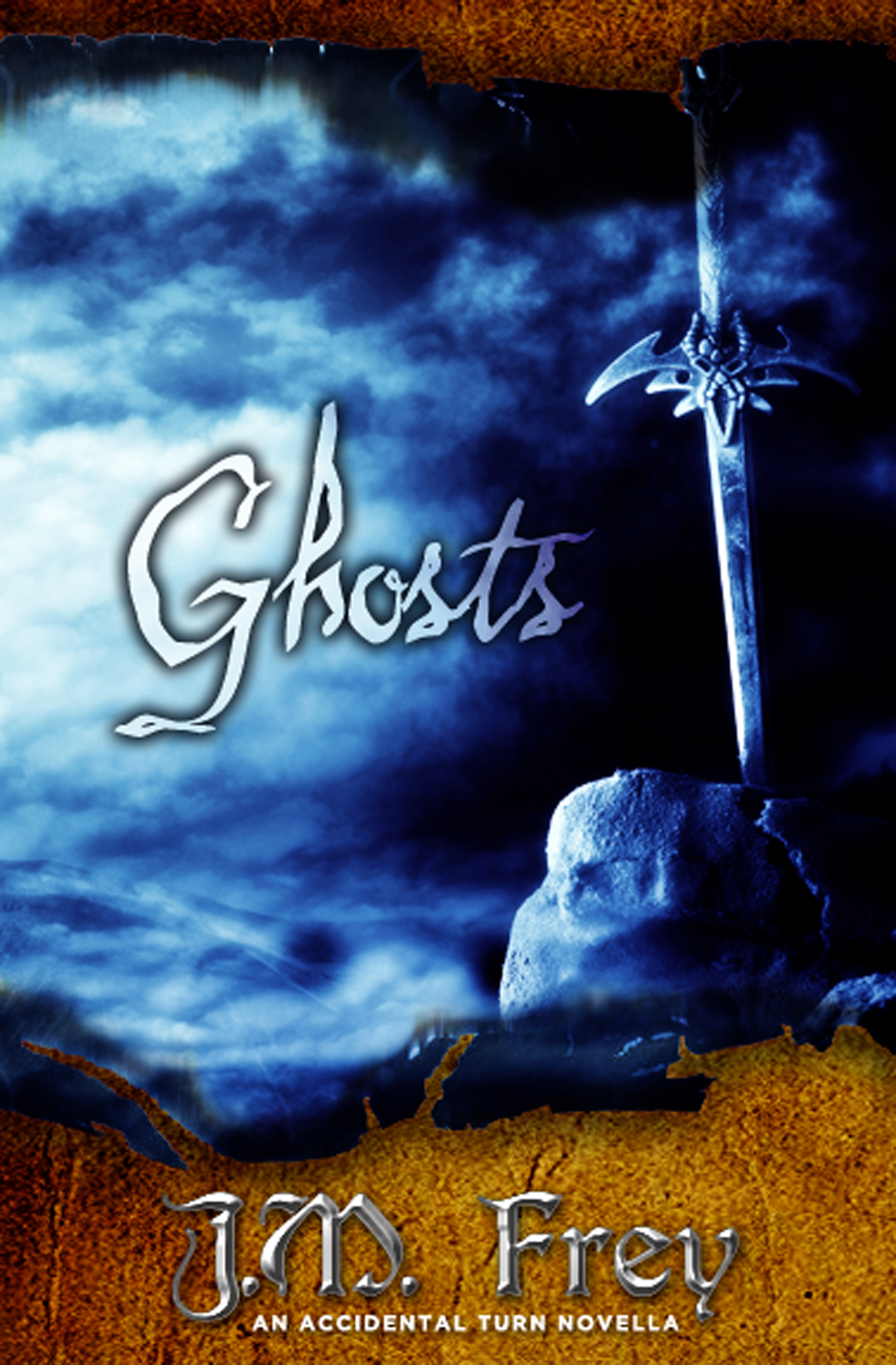
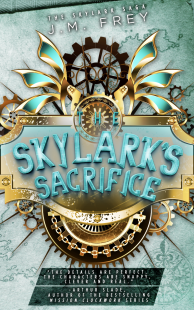
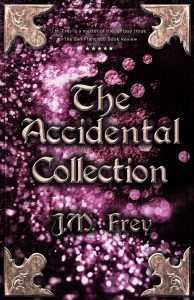
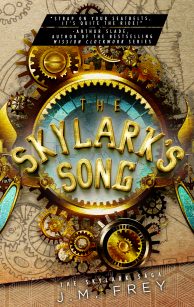
Reviews
There are no reviews yet.